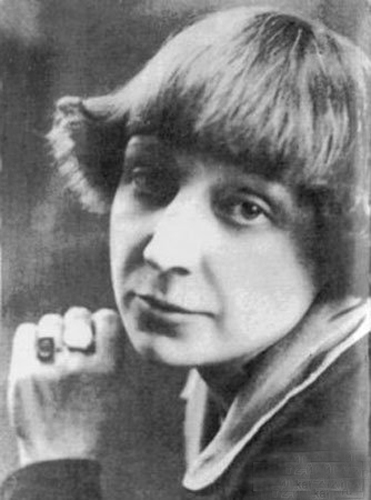 Мари́на Ива́новна Цвета́ева (26 сентября (8 октября) 1892, Москва — 31 августа 1941, Елабуга) — русская поэтесса, прозаик, переводчица, одна из крупнейших поэтов XX века. In 1997, the Washington Museum of Russian Poetry and Music was founded in Rockville, Maryland, by the songwriter-singer Dr. Uli Zislin. The museum includes the work of five famous Russian poets of the Silver Age (1920s): Anna Akhmatova, Nikolay Gumilev, Osip Mandelstam, Boris Pasternak, and Marina Tsvetaeva.[24] In 2014, Natalia G. Toreeva created two new posters for the museum, which included these five poets.
Мари́на Ива́новна Цвета́ева (26 сентября (8 октября) 1892, Москва — 31 августа 1941, Елабуга) — русская поэтесса, прозаик, переводчица, одна из крупнейших поэтов XX века. In 1997, the Washington Museum of Russian Poetry and Music was founded in Rockville, Maryland, by the songwriter-singer Dr. Uli Zislin. The museum includes the work of five famous Russian poets of the Silver Age (1920s): Anna Akhmatova, Nikolay Gumilev, Osip Mandelstam, Boris Pasternak, and Marina Tsvetaeva.[24] In 2014, Natalia G. Toreeva created two new posters for the museum, which included these five poets. Marina Ivanovna Tsvetaeva (Russian: Мари́на Ива́новна Цвета́ева; IPA: [mɐˈrʲinə ɪˈvanəvnə tsvʲɪˈtaɪvə]; 8 October [O.S. 26 September] 1892 – 31 August 1941) was a Russian and Soviet poet. Her work is considered among some of the greatest in twentieth century Russian literature. She lived through and wrote of the Russian Revolution of 1917 and the Moscow famine that followed it. In an attempt to save her daughter Irina from starvation, she placed her in a state orphanage in 1919, where she died of hunger. Tsvetaeva left Russia in 1922 and lived with her family in increasing poverty in Paris, Berlin and Prague before returning to Moscow in 1939. Her husband Sergei Efron and her daughter Ariadna Efron (Alya) were arrested on espionage charges in 1941; and her husband was executed. Tsvetaeva committed suicide in 1941. As a lyrical poet, her passion and daring linguistic experimentation mark her as a striking chronicler of her times and the depths of the human condition.
Marina Ivanovna Tsvetaeva (Russian: Мари́на Ива́новна Цвета́ева; IPA: [mɐˈrʲinə ɪˈvanəvnə tsvʲɪˈtaɪvə]; 8 October [O.S. 26 September] 1892 – 31 August 1941) was a Russian and Soviet poet. Her work is considered among some of the greatest in twentieth century Russian literature. She lived through and wrote of the Russian Revolution of 1917 and the Moscow famine that followed it. In an attempt to save her daughter Irina from starvation, she placed her in a state orphanage in 1919, where she died of hunger. Tsvetaeva left Russia in 1922 and lived with her family in increasing poverty in Paris, Berlin and Prague before returning to Moscow in 1939. Her husband Sergei Efron and her daughter Ariadna Efron (Alya) were arrested on espionage charges in 1941; and her husband was executed. Tsvetaeva committed suicide in 1941. As a lyrical poet, her passion and daring linguistic experimentation mark her as a striking chronicler of her times and the depths of the human condition. The Soviet composer Dmitri Shostakovich set six of Tsvetaeva's poems to music. Later the Russian-Tatar composer Sofia Gubaidulina wrote a Hommage à Marina Tsvetayeva featuring her poems. Her poem "Mne Nravitsya..." ("I like that...")], was performed by Alla Pugacheva in the film Irony of Fate. In 2003, the opera Marina: A Captive Spirit, based on Tsvetaeva's life and work, premiered from American Opera Projects in New York with music by Deborah Drattell and libretto by poet Annie Finch. The production was directed by Anne Bogart and the part of Tsvetaeva was sung by Lauren Flanigan. The poetry by Tsvetaeva was set to music and frequently performed as songs by Elena Frolova, Larisa Novoseltseva, Zlata Razdolina and other Russian bards.
The Soviet composer Dmitri Shostakovich set six of Tsvetaeva's poems to music. Later the Russian-Tatar composer Sofia Gubaidulina wrote a Hommage à Marina Tsvetayeva featuring her poems. Her poem "Mne Nravitsya..." ("I like that...")], was performed by Alla Pugacheva in the film Irony of Fate. In 2003, the opera Marina: A Captive Spirit, based on Tsvetaeva's life and work, premiered from American Opera Projects in New York with music by Deborah Drattell and libretto by poet Annie Finch. The production was directed by Anne Bogart and the part of Tsvetaeva was sung by Lauren Flanigan. The poetry by Tsvetaeva was set to music and frequently performed as songs by Elena Frolova, Larisa Novoseltseva, Zlata Razdolina and other Russian bards.